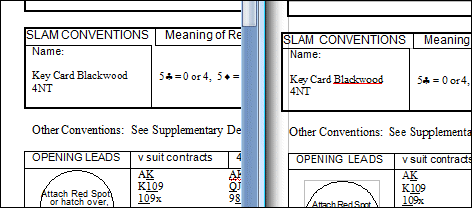After the intense interest in OOXML vs ODF during last year’s ISO document standardisation wars, I’m surprised that the inclusion of OpenDocument support in the newly-released Office 2007 SP2 has attracted so little attention. Well, not really surprised. The general public doesn’t care much about document formats as such, just that the documents they send and receive open OK. The anti-OOXML fervour was about exploiting a chink in the armour of Microsoft’s de facto near-monopoly in Office suites.
Well, Microsoft has ticked the box now. I haven’t done exhaustive tests; but I did some sanity checks. I opened a .docx (OOXML) in Word, saved it as OpenDocument Text; opened in OpenOffice.org, saved it out to a new .odt document, opened that in Word, saved it out as docx. And you know what? It looks the same. Even the styles are still there. What’s more the conversion was fast and convenient, just a Save As. All in all, a contrast with the wretched experience I had with the earlier Microsoft-sponsored converter.
Next, I tried a small stress-test; a .doc bidding card for Contract Bridge that has some tricky tables. This document crashed WordPerfect’s .odt converter. Word could happily save it as .odt and reopen. Opening the exported .odt in OpenOffice showed some minor differences – part of the table went slightly out of alignment, as the illustration shows (Word is on the left, OpenOffice 3.0 on the right), but nothing drastic.

Is this the end of the format wars? Not quite; there is still a long list of features not supported by the conversion, and if you want an easy life it still pays to stay with one vendor’s Office suite. My impression though is that Microsoft has done a decent job, and that for everyday documents the conversion will work as expected.
For the OpenDocument crowd, getting the format incorporated into Microsoft Office is a victory of sorts, but not the real goal, which is to establish it as the universal document format. Microsoft is betting that its inclusion will help it sell Office, but that customers will still mostly use .doc or .docx (and the Excel equivalents). If enough institutions mandate OpenDocument, that bet could yet fail, but right now that looks unlikely.
Update
Ivan Zlatev reports on a less successful import here.
Update 2
While word processing import and export is reasonable in some circumstances, there is a deal-breaking problem with spreadsheet import and export: all formulae are either ignored or broken. That is, you can save from Excel to .ods, open in OpenOffice.org Calc, and get cells like msoxl:=SUM(C6:C8) (in plain text). You can save from OpenOffice.org Calc, open in Excel, and find formulae converted to plain text. If you save and open sheets from Excel, but in .ods format, it works; the clue why is in the OpenOffice.org rendering. It appears Microsoft has stuck by the letter of the standard, which does not specify how formulae work, but broken any kind of meaningful interoperability.
Interesting experiment. I hope Microsoft won’t be a monopoly for ages.
Tim,
Would it be possible to provide a link to the document that you used in this test?
Thanks!
@Sumanth there’s some personal data in there I would need to strip out – will try to do this when I get a moment.
Tim